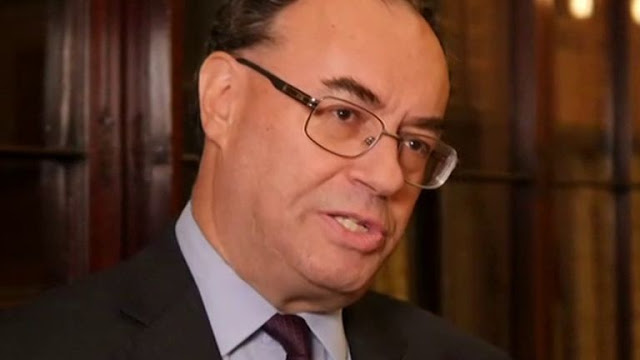"Britain nearly went bust in March, says Bank of England", reads a headline in the Guardian. In similar vein, the Telegraph's Business section reports "UK finances were close to collapse, says Governor":Eh, what? The Governor of the Bank of England says the UK nearly turned into Venezuela? Well, that's what the Telegraph seems to think: The Bank of England was forced to save the Government from potential financial collapse as markets seized up at the height of the coronavirus crisis, Governor Andrew Bailey has said. In his most explicit comments yet on the country's precarious position in mid-March, Mr Bailey said 'serious disorder' broke out after panicking investors sold UK government bonds in a desperate hunt for cash. It left Britain at risk of failing to auction off the gilts needed
Topics:
Frances Coppola considers the following as important: Bank of England, central banks, coronavirus, Financial Crisis, financial stability, fiscal policy, government debt, Interest rates, markets, Monetary Policy, recession, UK
This could be interesting, too:
Jeremy Smith writes UK workers’ pay over 6 years – just about keeping up with inflation (but one sector does much better…)
Angry Bear writes A Fiscal Policy in a Global Context?
Matias Vernengo writes Very brief note on the Brazilian real and the fiscal package
Matias Vernengo writes Elon Musk (& Vivek Ramaswamy) on hardship, because he knows so much about it
The Bank of England was forced to save the Government from potential financial collapse as markets seized up at the height of the coronavirus crisis, Governor Andrew Bailey has said. In his most explicit comments yet on the country's precarious position in mid-March, Mr Bailey said 'serious disorder' broke out after panicking investors sold UK government bonds in a desperate hunt for cash. It left Britain at risk of failing to auction off the gilts needed to fund crucial spending - and Threadneedle Street had to pump £200bn into markets to restore a semblance of order.
Bailey: We basically had a pretty near meltdown of some of the core financial markets….I got to Wednesday afternoon, and the markets team came down here, and you know it’s not good when they turn up en masse, and you know it’s not good when they say “we’ve got to talk”, and it wasn’t good. We were in a state of borderline disorderly, I mean it was disorderly in the sense that when you looked at the volatility in what was core markets, I mean core exchange rates, core government bond markets, we were seeing things that were pretty unprecedented certainly in recent times, and we were facing serious disorder.
Conway: How scary was that? What would have happened if the Bank hadn’t stepped in?
Bailey: “Oh I think the prospects would have been very bad. We would have had a situation in which in the worst element the Government would have struggled to fund itself in the short run”.
Or - did it? Government struggling to fund itself "in the short run" simply means that it might have needed to pay out money before it could raise it. Normally it would cover short-term cash needs by issuing Treasury bills, which are short-dated, highly liquid bonds with very low interest rates. But when markets are malfunctioning, it can't do this. And high-interest gilts or pandemic bonds would take time to issue. So it could potentially find itself short of ready cash for urgent spending.
Conway: At the time you were nervous about government not being able to finance itself.
Bailey: Yes, because of market instability.
How would this have played out if we hadn’t taken the action that we and other central banks took? I think you would have seen a risk premium enter into interest rates, I think markets would have priced in a risk premium, and it could have been quite substantial given the degree of instability we were seeing. That would have raised the effective borrowing cost throughout the economy. In terms of the Bank of England's objectives, that would have made it harder for us to achieve our objectives, both in terms of inflation and in terms of economic stability.
It's entirely necessary that the state has to step in at this point. In a shock of this nature, you can't leave it to individual citizens to find their way through it, "well, good luck" sort of thing. The state has to assert its role at this point, which it did. It wasn't easy, but it did it.

